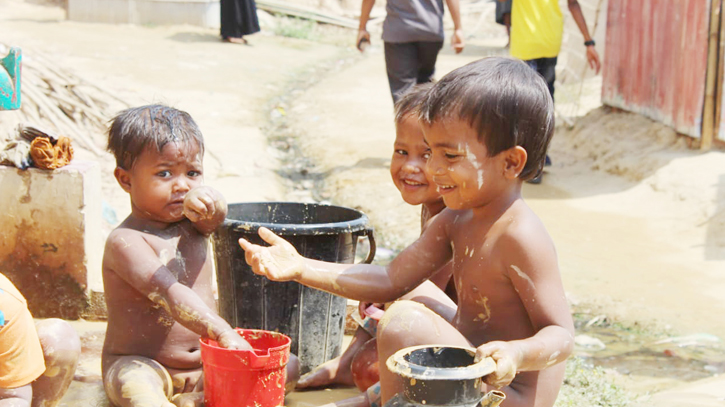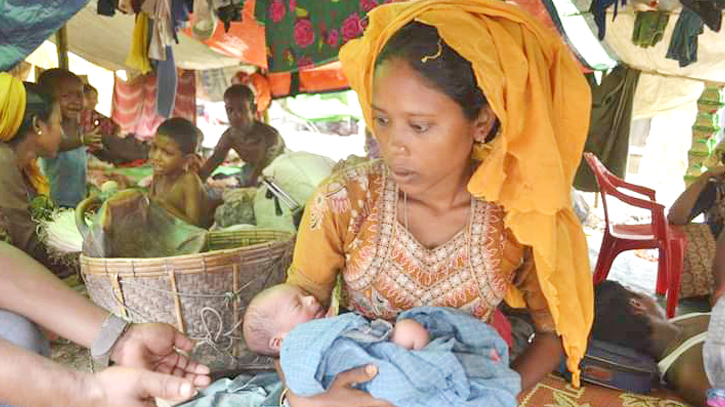
Photo: Messenger
Rohingyas living in camps are disinterested in family planning and have more babies to get more rations from the government and non-governmental organisations (NGOs), say doctors and health workers working at camps as well as locals.
The more children a family has, the more rations they receive. Government and private aid is provided in proportion to the number of family members, they also say, adding that having babies has become more like a competition.
There are even allegations that many families collect more rations by having more babies and send those to Myanmar to receive drugs. Rohingya families that came in 2017 have had two to five children on average with the objective of creating more ration cards by increasing the number of members.
After a meeting of the Rohingya security task force last year, Home Minister Asaduzzaman Khan said that the birth rate in the camps is alarming and 35,000 children are born there every year.
“The Ministry of Health and the Ministry of Religious Affairs are working together to bring down the birth rate. According to the Office of Refugee Relief and Repatriation, about 100 children are born every day in the Rohingya camps. In six and a half years, the number is almost 2.5 lakh,” he said.
Aslam Uddin lives in the Balukhali camp of Ukhiya. He has been living in Bangladesh for six years and a half with nine children and his wife. He has five boys and four girls. He said,
“Allah is giving me children. Why should I interrupt the process? Through them, Allah has increased our sustenance. As I have more children, I am getting more rations.”
This is the picture of not only Balukhali but also the 34 camps in Cox's Bazar. Asma Akhter works as a supervisor at the health centre in the RTMI UNFPA project in the Rohingya camps.
She said that the Rohingyas are not interested in adopting long-term family planning.
“I bring couples and their mothers-in-law to the healthcare centre for counselling. Rohingyas want to use pills and condoms. But they are not interested at all in the long-term plans that last for three or five or 10 years. This is because they think that the more children are born, the per capita ration will be higher. For this, they are interested in having more babies.”
In just six years and a half, locals in Cox's Bazar have almost become minorities in terms of birth rate. Questions have also arisen over the identities of the Rohingya babies born in Bangladesh. There is a debate over whether they will get Bangladeshi citizenship or be considered Rohingya children.
 Jahangir Kabir Chowdhury, chairman of Rajapalong union parishad in Ukhiya, said along with repatriation, it has become more important now to control the birth rate in Rohingya camps.
Jahangir Kabir Chowdhury, chairman of Rajapalong union parishad in Ukhiya, said along with repatriation, it has become more important now to control the birth rate in Rohingya camps.
“There are not many entertainment options in the camps, which is why Rohingyas spend idle time and focus on reproduction. If this continues, locals will become a minority in this region,” he said.
Refugee Relief and Repatriation Commissioner Mohammed Mizanur Rahman said the birth rate of Rohingyas is higher than that of Bangladeshis. “It can also be said that their birth rate is higher than that in Cox's Bazar. An average of 100 children are born in the camps every day. Controlling this is a big challenge for us.”
According to data published by UNHCR, there are a total of two lakh families in the Rohingya camps and 3 per cent of the families have more than 10 members while 10 per cent have eight to nine members. Besides, 23 per cent of the families have six to seven members and 28 per cent have one to three members.
Moreover, the average number of members per family is five. 52 per cent of the Rohingyas registered in the camps are children aged zero to 17. Most of the Rohingya camps are in Cox's Bazar’s Kutupalong, which is said to be the largest refugee camp in the world.
Messenger/Disha








